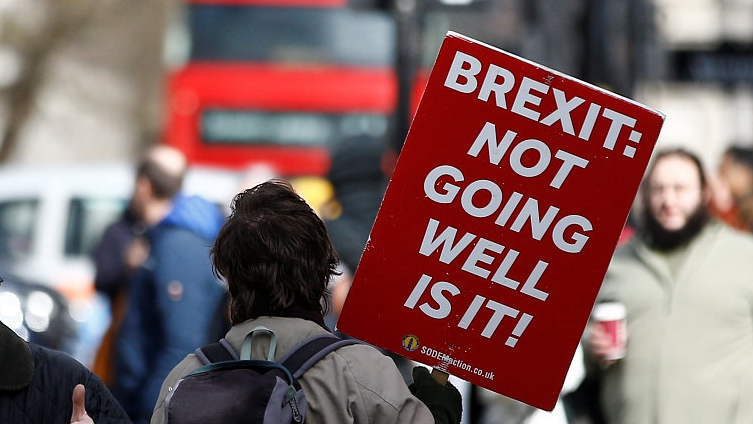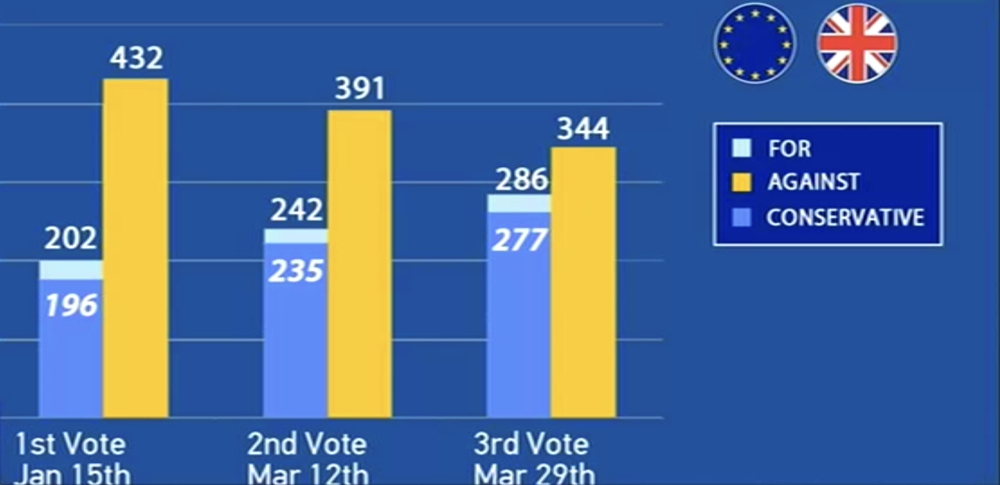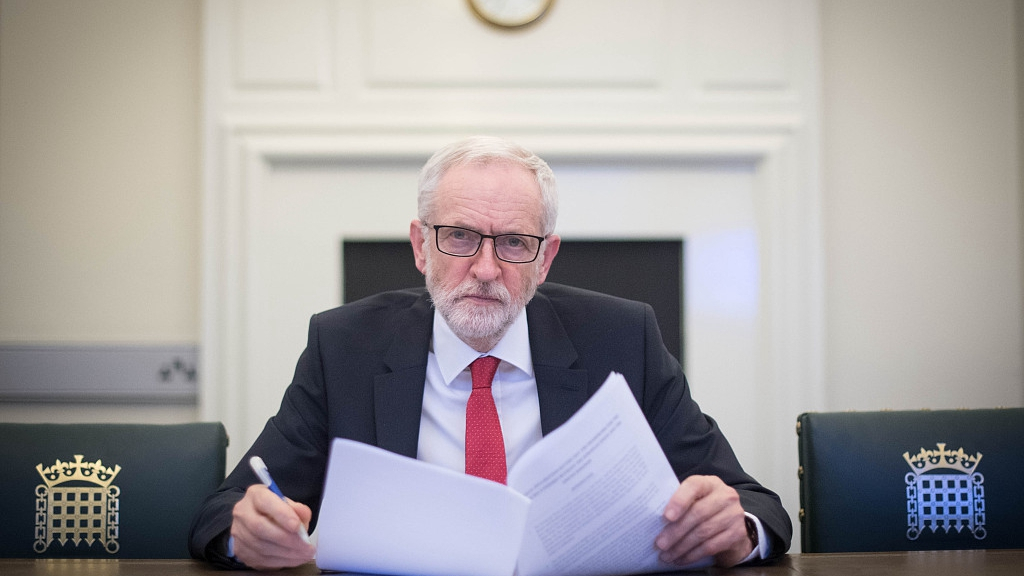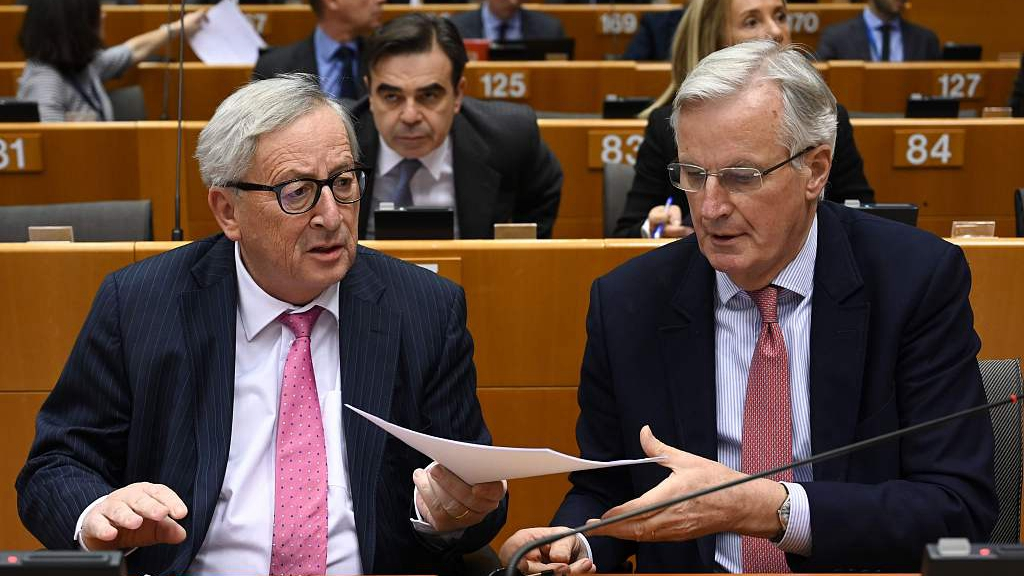
Europe
18:11, 04-Apr-2019
Decoding Brexit: What happens next?
Updated
18:33, 04-Apr-2019
By Nayan Seth, Li Jingyi
02:46

British MPs Wednesday voted narrowly in favor of legislation that would force the government to seek to delay Brexit beyond the current April 12 deadline. The vote passed by just one – 313 votes in favor and 312 against – in the lower House of Commons and the bill will now pass to the upper House of Lords for final approval on Thursday.
The legislation will avoid a no-deal Brexit, thus, effectively ruling out a hard Brexit. The proposal which was tabled by Labour party's Yvette Cooper was approved in a single day.
Read more:
The bill is different from the so-called indicative votes, as it is legally binding for the prime minister to seek an extension from the European Union (EU) to avoid a no-deal Brexit on April 12.
So, what happens now? Let's try and decode the ever-changing Brexit scenarios.

British Prime Minister Theresa May's EU withdrawal deal has been rejected three times by lawmakers. /CGTN Photo
British Prime Minister Theresa May's EU withdrawal deal has been rejected three times by lawmakers. /CGTN Photo
Having failed to secure MPs' backing for her deal, British Prime Minister Theresa May is likely to ask the EU for a further delay. But before throwing in the towel, she's making one last attempt to salvage her deal.
She met with opposition Labour leader Jeremy Corbyn on Wednesday and talks are likely to continue on Thursday.
If they agree on a new pact, she would go to the EU emergency summit held on April 10 and seek support for her new plan and an extension probably until May 22.

Britain's main opposition Labour Party leader Jeremy Corbyn poses with a copy of the Political Declaration setting out the framework for the future UK-EU relationship, in his office in the Houses of Parliament in London, April 2, 2019. /VCG Photo
Britain's main opposition Labour Party leader Jeremy Corbyn poses with a copy of the Political Declaration setting out the framework for the future UK-EU relationship, in his office in the Houses of Parliament in London, April 2, 2019. /VCG Photo
However, if May and Corbyn fail to reach an agreement, May would have no option but to try to get another short extension from the EU. But this time, the European bloc is likely to press for a longer extension and force the UK to take part in European elections on May 23.
Therefore, if there is no agreement and the EU refuses to provide a short extension or May doesn't agree for a longer delay, the UK could still leave the EU without a deal on April 12. It would violate the parliament's law which has ruled out a no-deal Brexit.
The government would probably have to unilaterally cancel Brexit, which seems an unlikely scenario to many observers.

European Commission President Jean-Claude Juncker (L) and EU Brexit chief negotiator Michel Barnier (R) attend a debate on the UK's withdrawal from the EU, during a plenary session at the European Parliament in Brussels, April 3, 2019. /VCG Photo
European Commission President Jean-Claude Juncker (L) and EU Brexit chief negotiator Michel Barnier (R) attend a debate on the UK's withdrawal from the EU, during a plenary session at the European Parliament in Brussels, April 3, 2019. /VCG Photo
For the EU side, the possibility of a no-deal Brexit remains big. European Commission President Juncker called a no-deal Brexit “very likely scenario,” despite reluctance to see so, the EU is ready for this result, he said.
German Chancellor Angela Merkel, on the other hand, said she will fight “until the last hour” to avoid a no-deal Brexit.
Now there's just over a week to go before the deadline. It's a race against time for the United Kingdom.
(Cover: An anti-Brexit protester walks outside the Houses of Parliament in London, Britain, March 14, 2019. /VCG Photo)

SITEMAP
Copyright © 2018 CGTN. Beijing ICP prepared NO.16065310-3
Copyright © 2018 CGTN. Beijing ICP prepared NO.16065310-3